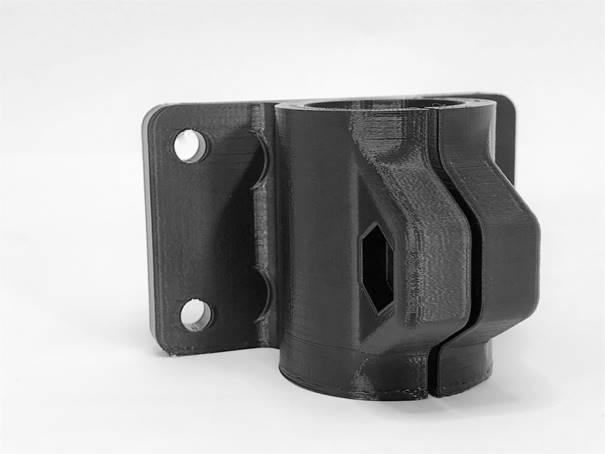Sustainable AM materials for functional components based on thermoplastic high-performance compounds
At Formnext, the LEHVOSS Group will present innovative, polymer-based materials for sophisticated 3D printing and their applications. It is demonstrated how the high demands of the end customers regarding product quality, reproducibility and processability are taken into account. The topics of sustainability and profitability are also in focus.
Sustainable solutions - Recycled and reusable materials for FFF - Replacement of non-recyclable materials
The need for sustainable materials is also growing in the field of 3D printing. The LEHVOSS Group is proud to launch its LUVOCOM 3F eco PET. This material is 90% based on recycled PET, which is currently the highest recycling rate on the market for a PET 3D printing material. LUVOCOM 3F eco PET is designed for the FFF (Fused Filament Fabrication) and FGF (Fused Granulate Fabrication) processes. Like all products from the LUVOCOM 3F product line, this material also impresses with its very good processability and excellent product properties. Areas of application are functional prototypes and series parts in numerous industries, such as mechanical, automotive and medical.
The first available product is LUVOCOM 3F eco PET 50291 BK, an unreinforced, black type with an excellent surface finish. The temperature resistance is up to 125 °C, with low water absorption at the same time. With the properties mentioned, it offers clear advantages over PETG, another variant of PET used in 3D printing on the market.
In addition to the development of materials, holistic considerations are also important for reducing the CO2 footprint. The creation of cost- and handling-optimized lamination standards (lamination molds or lamination tools) for the production of highly developed orthoses from CFRP laminates is still done nowadays using thermoset PU molded foams. These are milled and this creates waste as well as the later disposal of the molds.
For a case study, the mold manufacturing process using 3D printing was examined with the company adViva. LUVOCOM 3F PET CF 9780 BK was selected as the material. This is characterized by high strength and temperature resistance. In addition, it has good chemical resistance and is easy to print. Process-related requirements, such as the required heat resistance and freedom from moisture for the curing process in the oven vacuum process, are fully met by the printed lamination forms. Since minimal use of material is taken into account in the construction of the model - supported by the high strength of the selected 3D printing material - it is possible to work with little infill (support structure in the component). This results in an even smaller volume of material as residual material. The LUVOCOM 3F PET CF 9780 BK can be collected separately and sent for technical plastics recycling. After the components have been ground, new technical parts can be created using injection molding, for example. When the process is established in this application, a sorted return of material can be organized and nothing stands in the way of recycling.
Automotive SLS-material portfolio
LEHVOSS Group presents a whole package of LUVOSINT materials, perfectly designed for automotive, based on PP, PA12 and PA6. All materials are highly cost effective. In difference to existing materials, LUVOSINT materials are fully reusable, no used powders need to be disposed. “Against the background of the current debate of microplastics and sustainability a non-reusable SLS powder is a no-go for industrial use” says Marcus Rechberger, product manager LUVOSINT. Materials of the automotive portfolio are already colored truly black, so no additional dye color process is needed. All materials offer high stability which allows to run e.g. LUVOSINT PA6 8834 BK at higher oxygen levels in SLS machines, what saves a lot of nitrogen. For LUVOSINT PA12 9270 BK LEHVOSS is partnering with SLS service provider cirp GmbH, located right in the center of the German automotive industry. cirp is concentrating on high-quality automotive prints.
A perfect piece of hybrid technology: Blobber bike saddle
LEHVOSS will present a perfect show case for hybrid technology, an effective combination of SLS powder printing and traditional casting. Blobber is the product name of a new bike saddle, invented in Austria and engineered by NEMETON, an Austrian engineering and 3D printing company. NEMETON is an expert in polyurethane processing and and heavy user of LUVOSINT TPU X92A. Blobber offers a new concept of customizing bike saddles for each rider. Core of the invention is an inflatable and removable saddle upper. This upper consists of a shell, made by PU casting but this shell is built around an inner SLS printed lattice structure. LUVOSINT TPU X92A has been used. This hybrid concept guarantees performance, comfort and cost efficiency. “We did run through a very rude TÜV test program, therefore we rely on LUVOSINT TPU X92A, which gives the strongest prints in the market”, says Harald Stepanovsky. The Blobber saddle will soon be seen on public rental bikes in Austria and most likely more countries will follow.
www.lehvoss.de

 Deutsch (Germany)
Deutsch (Germany)  Polski (PL)
Polski (PL) 










